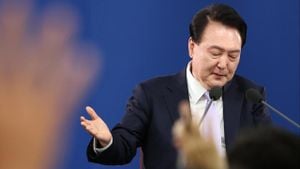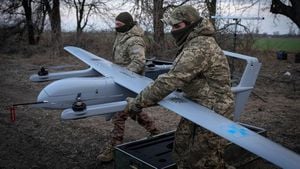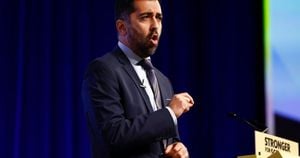Recent developments on the battlefield between Russia and Ukraine signal significant changes as both nations navigate the exhausting and protracted war, now stretching beyond 1,000 days. Among the latest shifts is the staggering announcement from the Russian Ministry of Defense, disclosing the enlistment of over 300,000 soldiers under voluntary contracts to contribute to what the Kremlin refers to as its "special military operation" in Ukraine.
This dramatic recruitment escalates the reliance on volunteer forces, a measure deemed politically savvy by the Russian government. Ivan Buvaltsev, who oversees combat training within the Russian Armed Forces, explained this new military strategy: the formation of reserve regiments aimed at training civilians willing to serve for set periods, distinguishing them from compulsory conscripts. This development suggests a shift away from mass conscription, which could deter public support amid the challenges of the war.
Contrastingly, Ukrainian forces are grappling with their own struggles. Reports have emerged highlighting rising desertion rates among Ukrainian soldiers, estimated to be around 200,000. Desertion is linked to the overwhelming psychological effects of continuous conflict. Ukrainian military officials are acknowledging the gravity of this issue as units retreat from the frontlines, losing ground, such as the recent fall of Vuhledar.
The Ukrainian leadership has adopted various strategies to combat these desertions, including offering incentives for soldiers to return to active duty. Yet, with mental health becoming increasingly significant, commanders often hesitate to impose punitive actions, recognizing the strain their troops endure. This dynamic complicates efforts to maintain morale and operational effectiveness.
Meanwhile, Ukraine's military needs have also intensified. President Volodymyr Zelenskyy has called for increased air defense capabilities to shield key infrastructures from Russian strikes. Notably, Ukraine is requesting tens of thousands of uncrewed robotic vehicles to support its ground troops by managing logistics and providing battlefield assistance.
Fresh military aid is also on the way, particularly from Germany and Norway. During his recent surprise visit to Kyiv, Chancellor Scholz pledged continued assistance, which includes advanced air defense systems and combat vehicles. Norway, too, is enhancing its involvement by deploying F-35 fighter jets and other military resources to support operations from Poland.
The stakes have escalated globally, with NATO's involvement now facing scrutiny. Ukraine's Foreign Minister has highlighted the potential for NATO's invitation to join the alliance to shift the war's dynamics significantly by removing one of Russia's key justifications for its aggression. Nonetheless, senior NATO officials have cast doubt on the likelihood of Ukraine receiving this invitation during the upcoming NATO meeting.
Geopolitical tensions are amplified by the dialogues surrounding foreign troops and mercenaries, as Ukraine considers enlisting assistance from European soldiers or military contractors to strengthen its forces. French President Emmanuel Macron recently suggested the option of deploying ground troops to prevent Russia's potential victory, yet many European leaders swiftly dismissed the notion of committing their own military personnel, wary of escalation.
These developments come amid other concerning global dynamics, such as crises involving potential Russian interference. For example, recent accusations surfaced about Bulgarian nationals allegedly spying for Russia, targeting journalists and reporting activities involving Ukrainian forces in Germany.
All these factors underline the complexity and gravity of the current military confrontations, where back-and-forth skirmishes dominate the headlines. Russia, continuing its aggressive posture, launched 110 drones overnight, with the Ukrainian Air Force successfully intercepting nearly half. Russian forces also reported the destruction of multiple Ukrainian drones, indicating the intensity of the conflict remains unabated.
Questions loom about military strategy and troop dynamics, as reliance on volunteer recruits becomes more central for both sides. The future of international military alliances, along with the effectiveness of these volunteer forces and the psychological challenges they face, are now front and center for observers of this drawn-out conflict.
With European citizens observing these developments and the associated political ramifications back home, leaders like British Prime Minister Keir Starmer are speaking out about the need for strong strategic positioning heading toward eventual peace negotiations with Russia.
The war has drastically changed the geopolitical scene, leading to intense scrutiny of Russia's motives, especially as it appears to draw support from ally nations like North Korea and China through weaponizing conflicts.
Key decisions lie on the horizon as global leaders weigh the prospect of direct military involvement. The intersection of domestic politics and foreign policy will undoubtedly shape the responses of NATO and the European Union as they navigate this delicate yet pivotal moment.



